Maria João Pires, invested doctor honoris causa by UPF
“People who express themselves through art are more creative, more critical, freer”
Maria João Pires was invested doctor honoris causa by UPF on 20 February at a ceremony in which she played a piece by Schubert. The Portuguese pianist was accompanied by her patron, Teresa Garcia-Milà, full professor with the Department of Economics and Business, and Josep Lluís Martí, professor with the Department of Law, delivered the laudatio.
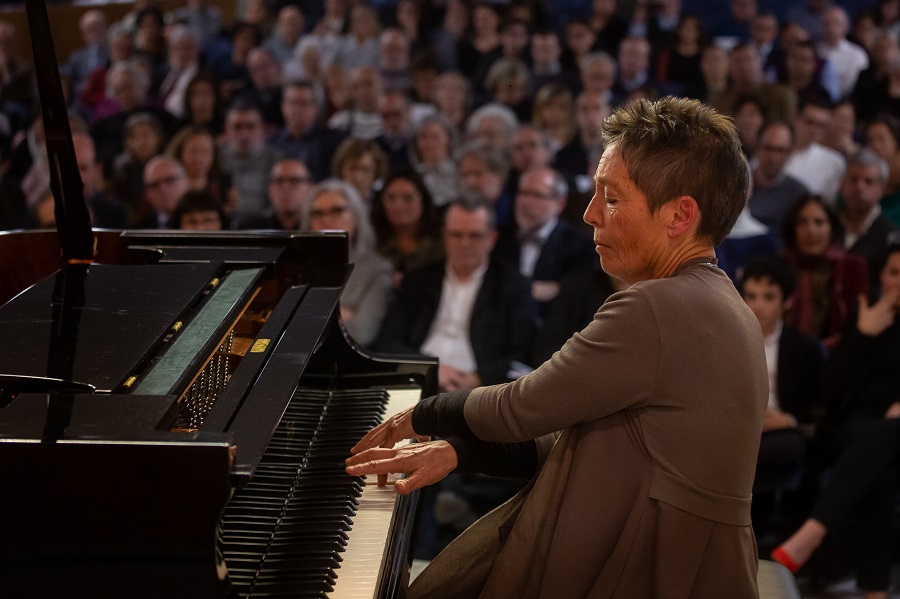
Maria João Pires, one of the most celebrated pianists and performers of classical music in recent decades, with a career spanning nearly seventy years, was invested doctor honoris causa by UPF at an academic ceremony which featured several artistic performances.
The event, which took place on 20 February 2019, in the afternoon in the auditorium of the Ciutadella campus was presided over by the rector of the University, Jaume Casals, who was accompanied at the head table by Núria Basi, president of the Board of Trustees, and Pere Torra, general secretary.
She is the third woman to have been invested doctor honoris causa by UPF, after Michelle Bachelet and Dorcas Muthoni
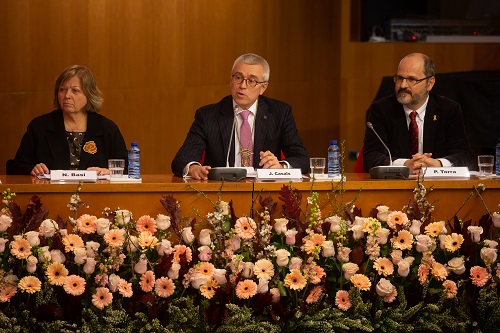 The ceremony, which could be followed live via the University website and through social networks with the tag #PiresHonorisUPF, included a piano performance by Maria João Pires, who played a piece by Schubert.
The ceremony, which could be followed live via the University website and through social networks with the tag #PiresHonorisUPF, included a piano performance by Maria João Pires, who played a piece by Schubert.
She is the second woman in a row to have been invested doctor honoris causa by UPF, following the Kenyan engineer Dorcas Muthoni (2017-2018 academic year), and the third in the history of the University (Michelle Bachelet, former president of Chile, was invested in the 2009-2010 academic year).
- Opening of the ceremony and reading of the agreement of the Board of Governors
- Entrance to the auditorium by the doctorand and performance by Cesc Gelabert
- Laudatio for the doctorand, by Josep Lluís Martí
- Investiture of Maria João Pires and acceptance speech
- Maria João plays a piece by Schubert
- Speech by Jaume Casals and Gaudeamus Igitur
- Short biography of Maria João Pires
- The Belgais project, with an innovative teaching method
- Photo album of the event posted on Flickr
- Video summary of the investiture ceremony published on YouTube
Opening of the ceremony and reading of the agreement of the Board of Governors
After the entrance by the academic authorities to the sound of the “March”, by P. Prelleur, performed by the chamber group of the Amadeus de VOZES orchestra, Jaume Casals opened the event. Then, Pere Torra, UPF general secretary, read the agreement of the Board of Governors of 14 December 2018 awarding the title of doctor honoris causa by UPF (at the proposal of the rector) to Maria João Pires.
The agreement mentions UPF’s desire to grant her this distinction “in recognition of her artistic excellence, for her contribution to the music world as one of the most acclaimed pianists and performers of classical music of recent decades, and especially for her contribution to a more holistic way of teaching music, strongly rooted in values and seeking the social integration of underprivileged people. Maria João Pires is an example to the world of how artistic development, more precisely musical development, can only be understood in the context of a strong social and humanistic commitment”.
Entrance to the auditorium by the doctorand and performance by Cesc Gelabert
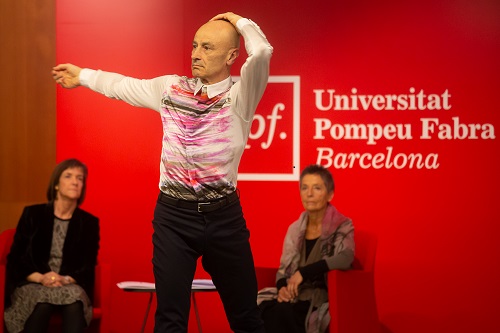 With the entire public standing, the doctorand, accompanied by her patron, Teresa Garcia-Mila, doctor of Economics, full professor of the Department of Economics and Business at UPF and director of the Barcelona Graduate School of Economics, entered the auditorium to the sound of Vivaldi’s Autumn, performed by the chamber group of the Amadeus de VOZES orchestra.
With the entire public standing, the doctorand, accompanied by her patron, Teresa Garcia-Mila, doctor of Economics, full professor of the Department of Economics and Business at UPF and director of the Barcelona Graduate School of Economics, entered the auditorium to the sound of Vivaldi’s Autumn, performed by the chamber group of the Amadeus de VOZES orchestra.
Then, the choreographer Cesc Gelabert, accompanied by Jordi Cameli on piano, performed his interpretation of “Prelude no. 6 (for the left hand)” by Mompou, in a most personal fusion of dance and music.
Laudatio for the doctorand, by Josep Lluís Martí
Josep Lluís Martí, doctor of Political and Social Sciences, professor of the Department of Law and vice-rector for innovation projects, delivered the laudatio speech for the candidate. He divided it into three parts: Maria and silence; Maria and the transformation, and Maria and love.
> Laudatio by Josep Lluís Martí (document pdf, in Spanish, 12 pages)
> Video of the laudatio by Josep Lluís Martí (31.34 min)
Excerpts from the laudatio speech
Maria João and silence
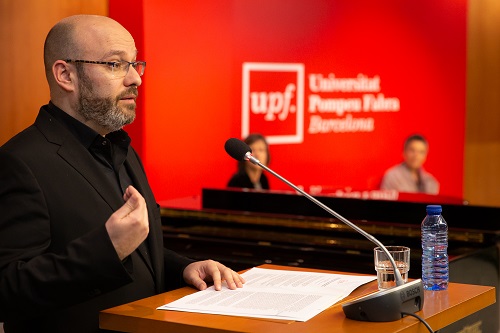 “That is to say that silence is the foundation or the original space that music reaches, from which music is constructed, taking in turn its own space, but leaving voids, empty spaces. These spaces are the silences that remain within music like the echoes of the original silence. ‘Music’, Pires says, ‘would be nothing without these spaces’”.
“That is to say that silence is the foundation or the original space that music reaches, from which music is constructed, taking in turn its own space, but leaving voids, empty spaces. These spaces are the silences that remain within music like the echoes of the original silence. ‘Music’, Pires says, ‘would be nothing without these spaces’”.
“Her style as a pianist is unmistakable: no one has accomplished her degree of subtlety, her delicate timbre, her unadulterated naturalness and depth of sound, without pomp, without unnecessary solemnity”.
“Maria João Pires’s contribution to music, art and world cultural heritage is priceless. The whole world is indebted to her. But it must be added that part of this debt is owed precisely by the city of Barcelona [...] (Maria João) has created a special bond with the people of Barcelona and we have had the immense fortune to enjoy her recitals”.
Maria João and the transformation
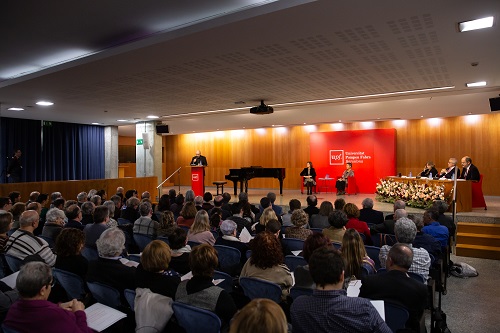 “Maria João has a deep, innovative insight into musical education, an experimental model, socially engaged and seeking individual and social transformation. First, she considers that before the terrible injustices that characterize our world today, all children should receive education [and I quote] “in the values of ethics, compassion and awareness, both self-awareness and awareness of the needs of others”.
“Maria João has a deep, innovative insight into musical education, an experimental model, socially engaged and seeking individual and social transformation. First, she considers that before the terrible injustices that characterize our world today, all children should receive education [and I quote] “in the values of ethics, compassion and awareness, both self-awareness and awareness of the needs of others”.
“The educational model upheld by Maria João Pires is an integral, interdisciplinary one in which ‘music and art are essential right from the inception of every child’s training cycle’, and must be combined, of course, with the other disciplines: philosophy, psychology, mathematics and the other sciences”.
“The ambitious educational project that Maria João has pursued throughout her life has been geared to producing genuine transformation of the individual which in turn results in a general social transformation that improves the living conditions of all human beings without distinction, or privileges, and doing so through knowledge, reflection, the arts, and of course, music”.
Maria João and love
“Music’s prime function, according to Maria João, is to generate a communion on equal terms between composer, performer and listener or audience. In fact, Maria João strongly rejects the distinction between the artist and the non-artist. ‘Everyone’, she says, “is an artist”.
“Maria João is of the opinion that only music that is fully shared is authentic music, music whose origin lies deep within our genuine self, in our nature, in our universe. ‘Music’, Maria João reminds us, ‘is by definition something that is common to us’”.
“For this last lesson that you teach us all, Maria João, that music is the house of us all, and that this music, as well as the truth, the authenticity of our nature, justice, and education we can only accomplish them and understand them through love, this university, which also strives to be a house for all, wishes to award you this more than deserved honorary degree”.
Investiture of Maria João Pires and acceptance speech
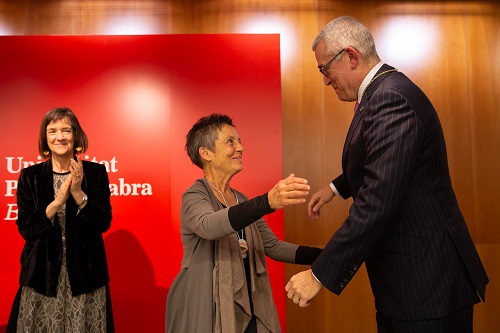 The laudatio speech concluded, the most solemn moment of the ceremony arrived, the investiture of Maria João Pires, when she received the medal of honoris causa by UPF from the rector, Jaume Casals, who gave her a fraternal embrace signalling her becoming a member of the University’s Senate of doctors.
The laudatio speech concluded, the most solemn moment of the ceremony arrived, the investiture of Maria João Pires, when she received the medal of honoris causa by UPF from the rector, Jaume Casals, who gave her a fraternal embrace signalling her becoming a member of the University’s Senate of doctors.
“You have been appointed doctor honoris causa by the UPF Board of Governors in recognition of your significant merits. By virtue of the authority conferred upon me, I award you this medal, a symbol of this title, and the diploma”, said the rector.
And as a new doctor by UPF, Maria João Pires, gave her acceptance speech.
> Acceptance speech (pdf, 3 pages, in French and in Catalan)
> Video of the acceptance speech (06:31 min)
Extracts from the speech by Maria João Pires
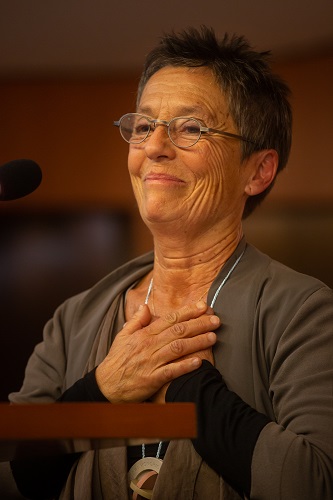 “I would like to say, first of all, I’m obviously very happy and I feel very honoured to receive this distinction from your university. This, for me, makes a lot of sense, because the same word university, which refers to ‘universality’, reminds us of the extent to which education, for all, is a crucial question for any society and for any civilization”.
“I would like to say, first of all, I’m obviously very happy and I feel very honoured to receive this distinction from your university. This, for me, makes a lot of sense, because the same word university, which refers to ‘universality’, reminds us of the extent to which education, for all, is a crucial question for any society and for any civilization”.
“I’ve always preferred the term ‘transfer’ to ‘teaching’ because it gives the feeling of continuity, of a necessary relief, and it also reminds us that we are traversed by things, but we do not possess them. This could be the formula for an ethic: not to take what we do not possess (that’s theft!), but to give what we do not possess”.
“My experience as a musician, which has led me to be here today, convinced me that art can also contribute to this resistance, allowing those who practise it (children, of course, but not only them) to develop intimate defences against the oppression of the norm”.
“(Art) allows everyone, by developing their independence and their perceptive abilities, to freely gain their own awareness of the world and open up to others as people and as citizens. It is, in my view, the condition of all hope. I thank you with all my heart”.
Maria João plays a piece by Schubert
The acceptance speech was followed by one of the most anticipated moments of the evening, when Maria João Pires walked decidedly to the piano to perform Schubert’s Impromptus Op. 142, no. 1, which resulted in lengthy and warm applause, the audience giving her a standing ovation.
> Performance of Schubert’s Impromptus no. 1, Opus 142 (12.34 min)
Speech by the rector Jaume Casals and performance of Gaudeamus Igitur
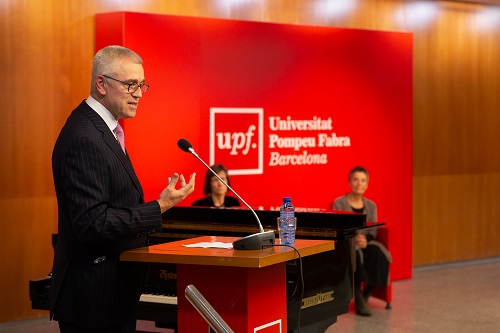 Now nearing the end of the ceremony, Jaume Casals delivered his closing speech. The rector initially reflected on a fear he had had in the mid-1990s, when he arrived at UPF, concerning the idea of whether language could signify an impoverishment of poetry and music, and in relation to Maria João Pires’s concept of silence developed by Josep Lluís Martí in his laudatio speech. “Silence is the origin of music, but music is also the origin of silence”, said Jaume Casals.
Now nearing the end of the ceremony, Jaume Casals delivered his closing speech. The rector initially reflected on a fear he had had in the mid-1990s, when he arrived at UPF, concerning the idea of whether language could signify an impoverishment of poetry and music, and in relation to Maria João Pires’s concept of silence developed by Josep Lluís Martí in his laudatio speech. “Silence is the origin of music, but music is also the origin of silence”, said Jaume Casals.
“We must make an effort to preserve the university as the house of culture”
Secondly, the rector stressed his joy at having celebrated the investiture ceremony because “we must make an effort to preserve the university as the house of culture”, he emphasized. “Universities in general have forgotten one of the two missions assigned to them: one is science and the other is to be the refuge, the space itself, where culture is preserved”.
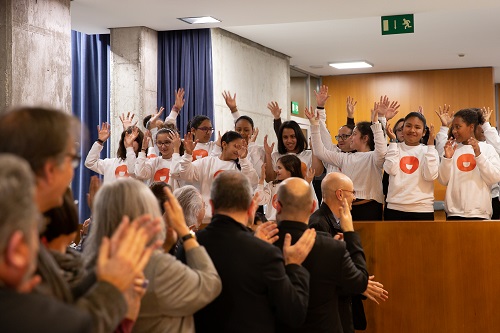 Finally, Jaume Casals spoke about the philosophical concept of love through different eras. First, he referred to Thales, when he said that “everything is full of gods”, in the sense that all that is beautiful, is relevant; then to Kant’s “reflective judgement”, which speaks of love, of eros, which arises before beauty; and thirdly, to the “power of love”, a more current term: “There are things for which we do not have a concept in order to prove them, but we have absolute certainty that it should be shared”. “The greatest power is the power of love, not that of the concept. Today we have witnessed one of those sublime strange moments in which what we cannot prove, has happened”, concluded the rector.
Finally, Jaume Casals spoke about the philosophical concept of love through different eras. First, he referred to Thales, when he said that “everything is full of gods”, in the sense that all that is beautiful, is relevant; then to Kant’s “reflective judgement”, which speaks of love, of eros, which arises before beauty; and thirdly, to the “power of love”, a more current term: “There are things for which we do not have a concept in order to prove them, but we have absolute certainty that it should be shared”. “The greatest power is the power of love, not that of the concept. Today we have witnessed one of those sublime strange moments in which what we cannot prove, has happened”, concluded the rector.
The traditional university anthem, Gaudeamus Igitur, entrusted to the Amadeus de VOZES children’s choir, made up of children from 7 to 14 years of age, was performed twice, at the request of the rector, bringing the investiture ceremony to its end.
This children’s choir, together with the chamber group of the Amadeus orchestra, with young people aged 16 to 19, are two groups arising from the VOZES project, which is working for social change through the integration and cohesion of children and teenagers with difficulties to access culture, to whom it provides musical training.
Short biography of Maria João Pires
Maria João Pires (Lisbon, July 1944), was born into a family of great artistic sensitivity. At the age of four she took the stage to play her first concert. She began her artistic studies at the conservatory of her hometown, where she met Campos Coelho and Francine Benoit, and continued them in Germany, first at the Munich Music Academy with Rosl Schmid, and later in Hannover, with Karl Engel.
Since then, Maria João Pires has performed around the world with such major orchestras as the Berliner Philarmoniker, the Boston Symphony Orchestra, the Royal Concertgebouw Orchestra, the London Philharmonic, the Orchestre de Paris, and the Wiener Philharmoniker.
Her repertoire, within classicism and romanticism, is based mainly on Mozart, Beethoven, Schubert and Chopin.
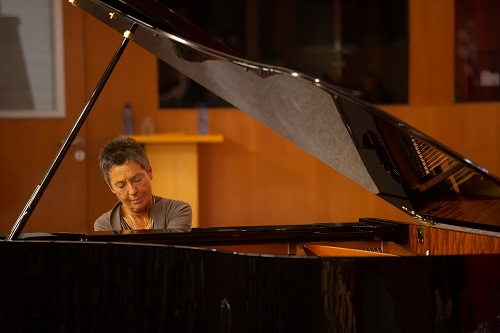 Maria João Pires playing a piece by Schubert during the investiture ceremony Her repertoire mainly focusing on Mozart, Beethoven, Schubert and Chopin, Pires was first linked to the Erato label for fifteen years, and then, since 1989, with Deutsche Grammophon.
Maria João Pires playing a piece by Schubert during the investiture ceremony Her repertoire mainly focusing on Mozart, Beethoven, Schubert and Chopin, Pires was first linked to the Erato label for fifteen years, and then, since 1989, with Deutsche Grammophon.
She left the label after a partnership of nearly twenty years as she considered that its trade policies were based on the use artists’ physical attributes putting aside their artistic qualities.
Her best performances, within the genres of classicism and romanticism, are Beethoven’s Sonatas (included in the album Moonlight); Schubert’s entire Impromptus (included in the album Le voyage magnifique); Chopin’s Nocturnal; Mozart’s trios and Fantasia; and Piano Concerto Op. 54 by Schumann.
She has received several awards including the Beethoven Bicentenary competition award in Brussels (1970), which consecrated her internationally; the Pessoa Prize (1989), the Fréderic Chopin Grand Prix International du Disc (1995), the Académie Charles Cros International Grand Prix (1996 and 1997); Grand Prix du Disc in honorem (1997) and the UNESCO International Music Council Prize (2002).
The Belgais project, with an innovative teaching method
In 1999, Maria João Pires founded the Centre de Belgais for the Study of the Arts, near Castelo Branco, an institution devoted to the teaching and dissemination of music among children and, in general, among the rural population, through a musical training project based on an innovative teaching method. Open air music festivals used to be held there, open to all, at which Pires and other artists from all over participated.
Her project aimed to encourage young musicians in the presence of other more veteran musicians and invite them to share the same stage.
The Belgais project sought to contest the traditional method of conveying musical knowledge practised in most schools and conservatories, to promote mutual listening between performers of different generations. In other words, encouraging young musicians in the presence of other more veteran musicians and inviting them to share the same stage. She wanted to get promising young artists out of the dynamics that focus on exams and competitions and encourage competitiveness and fame.
Pires ran into a great many obstacles and lacked support and assistance by the Portuguese public administration, and also received criticism from some of the population who did not approve of her method of teaching. This lack of support led her to leave the centre in 2006, and as a sign of protest, she went to live in Brazil.
Her Belgian stage began in 2012 as a resident teacher at the Queen Elisabeth Music Chapel (Waterloo), where she taught young pianists until 2016. In this country, where she currently resides, she undertook two additional projects: “Equinox”, which offered help to underprivileged children through choir singing and “Partitura” with the Chapelle Musicale of Brussels, to promote the careers of young talent, a programme in which Barcelona pianist Ignasi Cambra participated.
> Photo album posted on Flickr
> Video summary of the investiture ceremony published on Youtube

